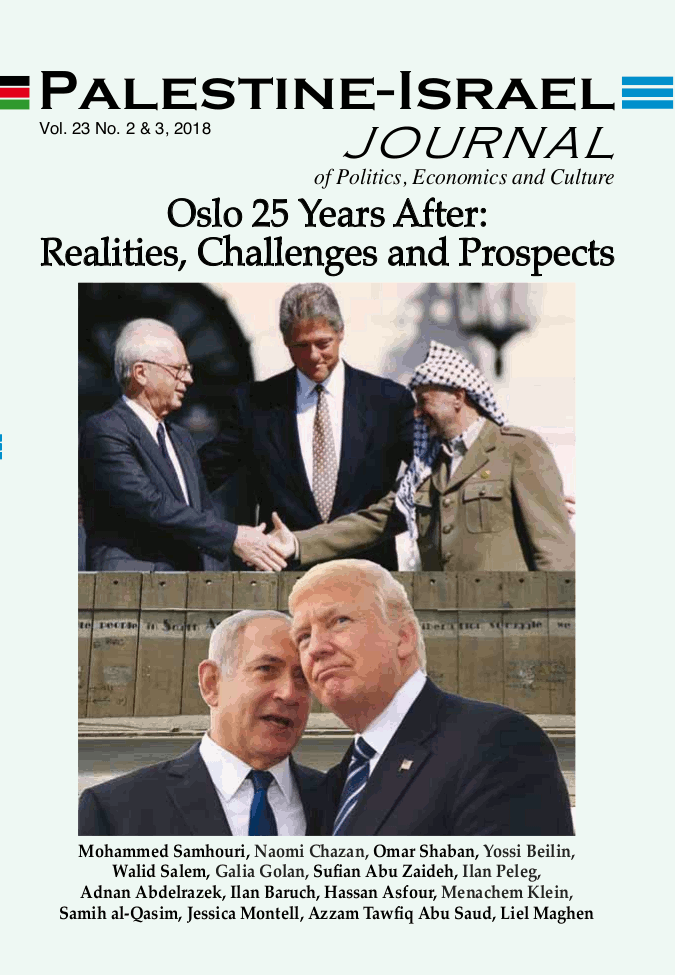I had been living in the United States for many years, working for peace with justice for Palestine, when the apparently groundbreaking negotiations between the Israelis, Palestinians, Syrians and Jordanians finally came to Washington, DC. During the numerous rounds of peace talks between the official delegations, we would coincidentally find ourselves in the same cafés during breaks, along with members of the local Arab American community. Informal discussions around the negotiations naturally ensued. In the faces of those around me were expressions of joy and hope that something extraordinarily good would result from the talks. Endless phone calls from our community excitedly asked when the delegations would be in Washington, so they could arrange to be there, in the orbit of these promising developments.
Unbeknownst to us, while the officials were meeting in Washington, DC, secret negotiations were taking place in Norway, which, to our surprise, resulted in the initial signing of the Oslo Accords that were later ceremonially signed on the South Lawn of the White House on September 13, 1993 — a day of unparalleled optimism that better days would come for all.
The atmosphere was electric …the cautionary op-eds of Edward Said and others that had appeared in that morning’s newspapers were put aside. Unfortunately, as it quickly became abundantly clear, they were absolutely right to sound the alarm. But during those heady days, we grasped this seemingly fantastic opportunity to finally free ourselves from the chokehold of occupation and set us on the road to independence and equality in the family of nations.
As the deputy director of the Palestine Affairs Center in Washington, DC, which became the PLO Mission after the signing, I was involved in the preparations for the negotiations. The change in the status of our office was an indication that Oslo was indeed enabling us to head in the right direction. Doors previously closed were open and welcoming. The 16 rounds of talks over the next six years also seemed to move toward, finally, the achievement of a peace that we could have worked with.
I remember doing an interview on Israeli TV saying it was remarkable to see our baby (Palestine) being reborn. I remember playing volleyball in Wye River in 1995, a Palestinian team and an Israeli team on a level playing field. The Israeli team won the first game; the Palestinians won the second. As the “captain” of the Palestinian team, I declined to go on to a third game, knowing that one of us would prevail, and I preferred to leave us both in a win-win situation.
Which was what I hoped would ultimately result from Oslo: a win-win situation for both sides. And there was so much hope that this would be the result … until the assassination of Yitzhak Rabin later in 1995. Despite the loss of our “partner for peace,” we persevered with “the process,” engaging in discussions with everyone, including the Americans, to advocate for peace with security for both Palestinians and Israelis.
The deadlock in 2000 did not deter us from our narrative that there was only one way to move forward, and that was to peace with justice. The sudden death of Yasser Arafat in 2004, considered by so many as the champion of peace alongside Rabin, diminished but did not completely extinguish our hope that we would one day be free. In my posts as the top diplomat to Mexico, Belize and Canada from 2005 to 2015, my message was the same: peace with justice that will bring security for both Palestinians and Israelis is not only possible, it is imperative.
After 25 years, many still ask me: What happened to the hope, the optimism that you propounded? While you were dreaming of achieving peace and security, you and your colleagues, Israel was planning to annex not only Jerusalem but all of the West Bank. Instead of improving, the situation for everyday Palestinians has worsened. It begs the question, if and how the Israelis are serious about achieving a durable peace.
In general, Oslo was the roadmap to peace. In detail, it decimated the fabric of Palestinian society as a national entity, dividing what remained of our land into Areas A, B and C; the Palestinians into “West Bank,” “Jerusalem” and “Gaza.”
Now, after 25 years, some Palestinians are calling for the PLO to devise a new strategy to confront the latest Israeli edicts. But we have a strategy, adopted in 1988: the two-state solution, with a politically and economically viable Palestinian state on the pre-June 4, 1967 borders. What we need is a strategy to finally achieve what we declared we would accept in 1988, through the same body that created the State of Israel in 1947, and to finally see implemented all UN resolutions relating to the “question of Palestine.”
Israel did not depend on the support of the United Nations alone to achieve its goals once the state was established, but rather on the commitment of the global Jewish community. The dream will only become a reality when all Palestinians, within and without, fully commit to Palestine. We all have a role to play in our respective societies, whether engaging within our political and civic communities or working to unify our efforts, we must strengthen our voice if we are to regain even a semblance of a realistic hope that the occupation will finally come to an end.
The time is long overdue for the Palestinian and Arab communities to wholly rouse themselves and take full responsibility to realize the dream of a sovereign, independent State of Palestine. As the saying goes, “It's not over ’til the fat lady sings” … but the final act is rapidly approaching.

